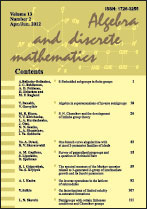|
This article is cited in 1 scientific paper (total in 1 paper)
RESEARCH ARTICLE
Zero-sum subsets of decomposable sets in Abelian groups
T. Banakhab, A. Ravskyc
a Faculty of Mechanics and Mathematics, Ivan Franko National University, Lviv, Universytet’ska 1, 79602, Ukraine
b Jan Kochanowski University in Kielce, Poland
c Department of Analysis, Geometry and Topology, Pidstryhach Institute for Applied Problems of Mechanics and Mathematics National Academy of Sciences of Ukraine, Naukova 3-b, Lviv, 79060, Ukraine
Abstract:
A subset $D$ of an abelian group is decomposable if $\varnothing\ne D\subset D+D$. In the paper we give partial answers to an open problem asking whether every finite decomposable subset $D$ of an abelian group contains a non-empty subset $Z\subset D$ with $\sum Z=0$. For every $n\in\mathbb N$ we present a decomposable subset $D$ of cardinality $|D|=n$ in the cyclic group of order $2^n-1$ such that $\sum D=0$, but $\sum T\ne 0$ for any proper non-empty subset $T\subset D$. On the other hand, we prove that every decomposable subset $D\subset\mathbb R$ of cardinality $|D|\le 7$ contains a non-empty subset $T\subset D$ of cardinality $|Z|\le\frac12|D|$ with $\sum Z=0$. For every $n\in\mathbb N$ we present a subset $D\subset\mathbb Z$ of cardinality $|D|=2n$ such that $\sum Z=0$ for some subset $Z\subset D$ of cardinality $|Z|=n$ and $\sum T\ne 0$ for any non-empty subset $T\subset D$ of cardinality $|T|<n=\frac12|D|$. Also we prove that every finite decomposable subset $D$ of an Abelian group contains two non-empty subsets $A$, $B$ such that $\sum A+\sum B=0$.
Keywords:
decomposable set, abelian group, sum-set.
Received: 18.11.2019
Revised: 21.03.2020
Citation:
T. Banakh, A. Ravsky, “Zero-sum subsets of decomposable sets in Abelian groups”, Algebra Discrete Math., 30:1 (2020), 15–25
Linking options:
https://www.mathnet.ru/eng/adm762 https://www.mathnet.ru/eng/adm/v30/i1/p15
|

| Statistics & downloads: |
| Abstract page: | 92 | | Full-text PDF : | 34 | | References: | 18 |
|




 Contact us:
Contact us: Terms of Use
Terms of Use
 Registration to the website
Registration to the website Logotypes
Logotypes








 Citation in format
Citation in format 
